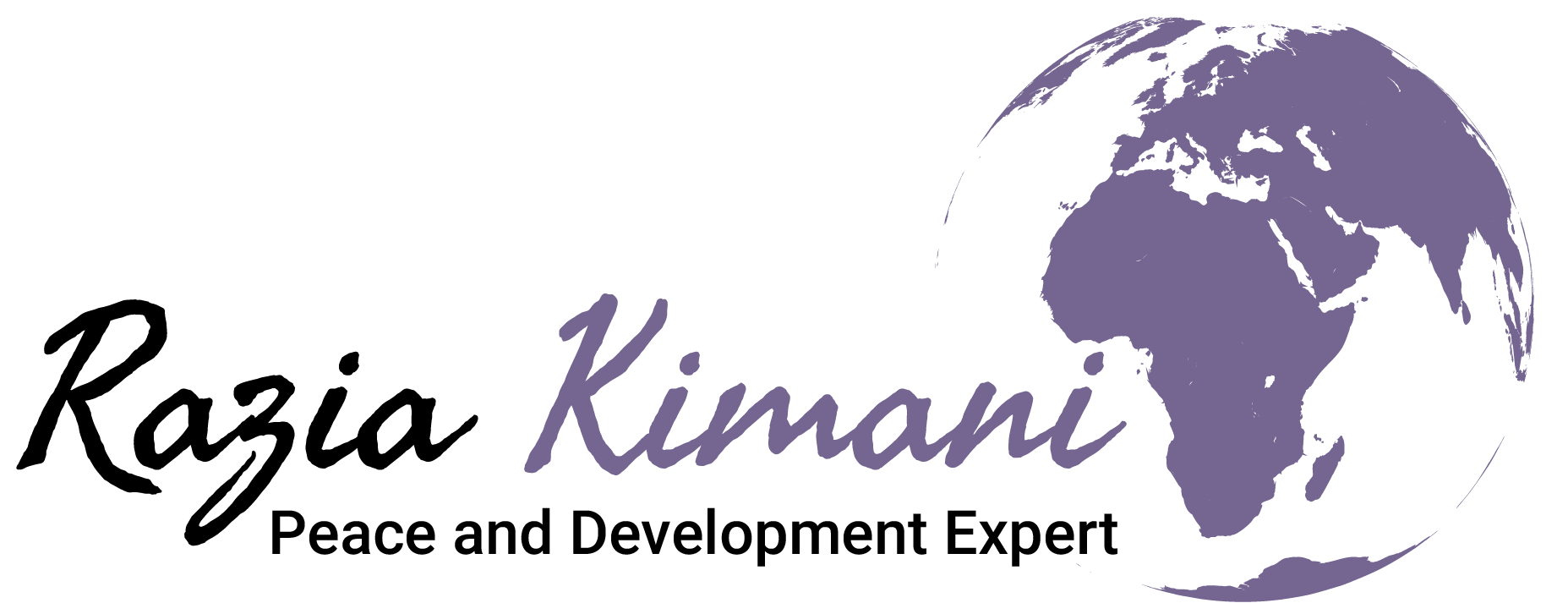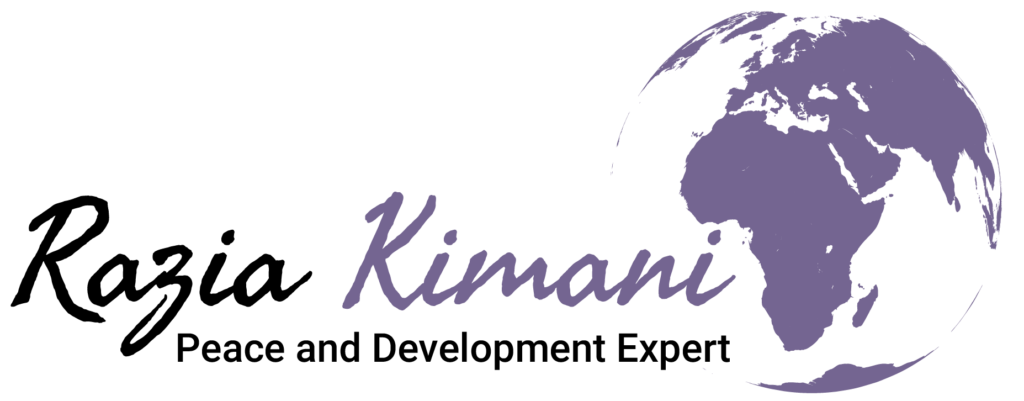Ms. Razia Kimani is a peace and development practitioner with 20+ years of experience in preventing conflict and violence in 21 conflict, fragile, and post-conflict countries in Africa, where she works to equip families, communities, civil society organisations, the private sector, governments, and development partners to prevent violence and conflict; build early warning and response systems; mediate and break cycles of violence and conflict; catalyse sustainable peace and development and a life of dignity for every citizen, co-create viable states with increasing self-reliance; and redefine balanced, principled, and coherent multilateralism.
Meet Razia Kimani
- Growing Up As A ‘Why’ Child
- Peace and Development Journey
- Co-Creating Tangible Impact
- Razia Outside Work
A Kenyan by birth, Razia who is the first of two daughters, grew up in Nairobi, Kenya where she spent most of her life except for time spent studying in London; working in Durban, South Africa; working in Asmara, Eritrea; and weeks of work travel primarily in Africa. Razia was always a “why” child. You know the ones who have a “Why?” for every explanation given. She had a curious mind and always sought to understand the world around her. An avid reader, she developed a knack for acting, singing, fashion, debating, and problem solving from an early age. Razia wanted to become a police woman when she “grew up” and later switched to a lawyer. The latter may have been influenced by her mother, who is an advocate in private practice. Whatever the motivation, what is clear between the two early career aspirations, is that Razia had and still has a very strong sense of justice and to see that all forms of injustice are addressed.

The 1994 Rwanda Genocide happened in Razia’s late teens and it had a profound impact on her. As Razia interacted closely with Rwandese refugees in Nairobi, she became consumed with understanding: what caused the genocide; how it happened; how to partner with Rwanda and Rwandese to recover from the trauma; and how best to ensure that another genocide never happened in Rwanda or elsewhere in Africa. Prevention of such violence and conflict is what motivated Razia to study International Relations and Psychology as undergraduate degrees and Violence, Conflict, and Development as a masters degree. Understanding and solving the problem of violence and conflict has directed Razia’s career path. She was privileged to visit Kigali, Rwanda as soon as she completed her masters degree in 2003, where she did a thesis on Reconciliation in Rwanda. Razia began her post-graduate career researching on and then working in and on Burundi, the Democratic Republic of Congo (DRC), and Rwanda; the Great Lakes Region conflict complex; co-creating the Pact on Security, Stability, and Development and its Programmes of Action and Protocols with governments in the region; and the founding of the International Conference on the Great Lakes Region (ICGLR) – a regional intergovernmental organisation – to implement the Pact.
When her country Kenya experienced the 2007-2008 post-election violence, Razia knew that she had to focus on Kenya and apply what she had learnt from years of research and experience in the Great Lakes Region. As a result of the skills and experience she had acquired in her work, Razia accurately forecast the post-election violence from as early as March 2007 before it was triggered in December of the same year. Even though she was not working on Kenya at the time, she engaged in advocacy and provided early warning information to peacebuilders working on and in Kenya.

Over the years working on preventing and addressing violence and conflict and seeking to equip families, communities, governments, civil society organisations, the private sector, the African Union (AU) and regional economic communities (RECs), the United Nations (UN), and development partners, has seen Razia pioneer: conflict early warning and response systems; the humanitarian-development-peace nexus before a term was coined; trauma healing and trauma informed approaches before they became buzz words; conflict-sensitive and peace-sensitive development; citizen-responsive governance; preventing and countering radicalisation and recruitment to violent extremism and the disengagement of radicalised and recruited persons; and locally-led development, before they became development imperatives.
With problem solving and connecting dots – people, resources, and solutions – as her dominant skills, Razia is passionate about creating value for money and tangible impact through every intervention she engages in. She believes in Africa, her people, her assets, and the immeasurable potential of all of these. Razia’s life desire is to leave a legacy of: healed and reconciled societies in Africa; where men and women, boys and girls live as equal partners who are actively and positively engaged in their families, communities, and nations; states that have just peace, inclusive and sustainable development and investments, self-reliance, and legitimate, accountable, and responsive institutions and systems; and a multilateral system where the sovereignty of all states is respected, the inviolability of the UN Charter and its principles are equally applied, and coherent multilateralism that reflects the world as it is today, is adopted.

Whilst she loves her work, Razia also loves to play hard and strives to have work-life integration as an imperative. She loves to eat healthy, stay hydrated, workout regularly, get enough sleep and rest, laugh frequently, dance and sing at the top of her voice, read good books and continually learn, and spend quality time in prayer and Bible study. Razia’s favourite people are her nieces and nephews and she thrives on spending quality time with them. She is passionate about people and invests in and walks alongside girls and women as they navigate life, family, work, and leadership. Razia, who developed a love for travel early in life from all the books she read, has a quest to visit all the beautiful and warm beaches of the world and looks forward to the day that she can look back and say that she visited all the ones on her bucket list and more. When she is not working hard to save travel money or travelling, Razia is an active member of her church and community and can be found singing at weddings or leading a band at church.

The Peace and Development Career
Razia is the Founder and Principal International Consultant of The Peace and Security Advisory – a bespoke consulting firm. She has a deep understanding of foresight, research, analysis, and designing and leading programmes in 21 fragile, conflict, and post-conflict contexts in Africa. Razia is widely recognised as a leader in the conflict prevention, peacebuilding, and preventing violent extremism (PVE) fields in East Africa, the Horn of Africa, the Swahili Coast, and the Great Lakes Region. A specialised advisor, she is a systems thinker who can take research and data, synthesise it to see patterns and the narrative of what is happening, and translate the same into timely, innovative, practical, and accessible policy, programmatic, and political solutions for tangible impact. Razia is a transformative leader and manager, who is adept at working with and managing integrated, multi-disciplinary, cross-cultural, and dispersed teams of varying size across the humanitarian-development-peace nexus. She is also recognised for national, regional, and international stakeholder engagement and coordination, business development, and resource mobilisation.
Prior to setting up The Peace and Security Advisory, Razia spent six years (2015-2021) with the United States Agency for International Development (USAID) Kenya and East Africa Mission where her last role was the Peace and Security Team Leader a.i. covering seven countries. She was appointed as the Office-in-Charge (OIC) and Deputy Office Director a.i. for USAID’s Office of Democratic Governance, Peace, and Security following the sudden authorised departure of all the American Foreign Service Officers in the office at the onset of the coronavirus (COVID-19) pandemic in March 2020. She successfully oversaw and managed an USD 85.6 million budget and team of nine with three direct reports from March to September 2020 within budget, timelines, and with high team performance working from home (WFH) in a unprecedented pandemic crisis environment.
Before her second stint at USAID, Razia, was an international consultant in conflict prevention and peacebuilding for four years (2011-2015) with the African Centre for the Constructive Resolution of Disputes (ACCORD) in South Africa; Coffey International; DanChurch Aid; IPE Global; International Rescue Committee (IRC) Kenya and IRC Eastern Africa; the United Nations Office for the Coordination of Humanitarian Affairs (UN OCHA) Regional Office for Eastern Africa and UN Country Teams (UNCTs) and UN Humanitarian Teams (UNHTs) in 10 countries and the Assistant Secretary General (ASG) for Humanitarian Affairs; United Nations Development Programme (UNDP) Regional Bureau for Africa (RBA); UN Women Somalia, UN Women South Sudan; and the World Humanitarian Summit (WHS) Secretariat. Prior to consulting, she held several competency-building positions in peace and development work, including as Peacebuilding Unit Coordinator with ACCORD in South Africa; Regional Project Manager for Women’s Land Rights in Southern Africa for ActionAid International; Rule of Law and Conflict Management Specialist with USAID/Kenya; and four years from 2004 to 2008 in various capacities with the Fellowship of Christian Councils and Churches in the Great Lakes Region and Horn of Africa (FECCLAHA) – a regional faith-based organisation with members in 11 countries and based in Nairobi.
Razia, who prizes opportunities to engage in communities of practice, is a member of the International Association for Professionals in Humanitarian Assistance (PHAP), Peace Exchange, and Kenya’s Peace Actors Association. She was recruited to the Joint UNDP and UN DPPA Programme on Building National Capacities for Conflict Prevention Senior Peace and Development Advisor roster.
“Don’t judge each day by the harvest you reap, but by the seeds that you plant”. – Robert Louis Stevenson
Featured Articles
The Peace and Security Advisory
We believe that: i) preventing violence and conflict; ii) designing and facilitating evidence-based peacemaking efforts with broad-based coalitions early in the conflict phase; iii) addressing the effects and impact of violence and conflict; iv) re/forming systems and institutions for citizen-responsive governance and peace-sensitive and inclusive development, investment, and political processes; v) co-creating viable states with increasing self-reliance; and vi) redefining balanced, principled, and coherent multilateralism, will break cycles of violence and conflict.

